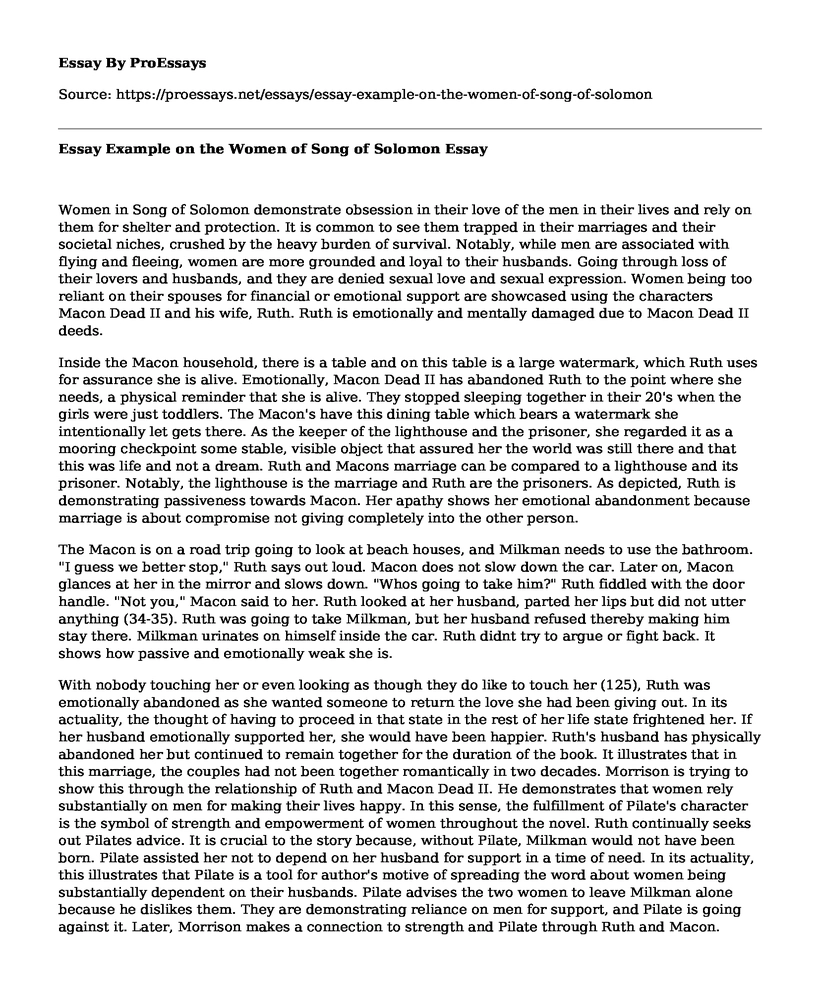Women in Song of Solomon demonstrate obsession in their love of the men in their lives and rely on them for shelter and protection. It is common to see them trapped in their marriages and their societal niches, crushed by the heavy burden of survival. Notably, while men are associated with flying and fleeing, women are more grounded and loyal to their husbands. Going through loss of their lovers and husbands, and they are denied sexual love and sexual expression. Women being too reliant on their spouses for financial or emotional support are showcased using the characters Macon Dead II and his wife, Ruth. Ruth is emotionally and mentally damaged due to Macon Dead II deeds.
Inside the Macon household, there is a table and on this table is a large watermark, which Ruth uses for assurance she is alive. Emotionally, Macon Dead II has abandoned Ruth to the point where she needs, a physical reminder that she is alive. They stopped sleeping together in their 20's when the girls were just toddlers. The Macon's have this dining table which bears a watermark she intentionally let gets there. As the keeper of the lighthouse and the prisoner, she regarded it as a mooring checkpoint some stable, visible object that assured her the world was still there and that this was life and not a dream. Ruth and Macons marriage can be compared to a lighthouse and its prisoner. Notably, the lighthouse is the marriage and Ruth are the prisoners. As depicted, Ruth is demonstrating passiveness towards Macon. Her apathy shows her emotional abandonment because marriage is about compromise not giving completely into the other person.
The Macon is on a road trip going to look at beach houses, and Milkman needs to use the bathroom. "I guess we better stop," Ruth says out loud. Macon does not slow down the car. Later on, Macon glances at her in the mirror and slows down. "Whos going to take him?" Ruth fiddled with the door handle. "Not you," Macon said to her. Ruth looked at her husband, parted her lips but did not utter anything (34-35). Ruth was going to take Milkman, but her husband refused thereby making him stay there. Milkman urinates on himself inside the car. Ruth didnt try to argue or fight back. It shows how passive and emotionally weak she is.
With nobody touching her or even looking as though they do like to touch her (125), Ruth was emotionally abandoned as she wanted someone to return the love she had been giving out. In its actuality, the thought of having to proceed in that state in the rest of her life state frightened her. If her husband emotionally supported her, she would have been happier. Ruth's husband has physically abandoned her but continued to remain together for the duration of the book. It illustrates that in this marriage, the couples had not been together romantically in two decades. Morrison is trying to show this through the relationship of Ruth and Macon Dead II. He demonstrates that women rely substantially on men for making their lives happy. In this sense, the fulfillment of Pilate's character is the symbol of strength and empowerment of women throughout the novel. Ruth continually seeks out Pilates advice. It is crucial to the story because, without Pilate, Milkman would not have been born. Pilate assisted her not to depend on her husband for support in a time of need. In its actuality, this illustrates that Pilate is a tool for author's motive of spreading the word about women being substantially dependent on their husbands. Pilate advises the two women to leave Milkman alone because he dislikes them. They are demonstrating reliance on men for support, and Pilate is going against it. Later, Morrison makes a connection to strength and Pilate through Ruth and Macon.
Toni Morrison substantially utilizes her character to depict various themes such as personal determination and motive. Her analysis of the marriage between Macon and Ruth adequately represents the theme of women abandonment. Ultimately, she uses the relationship between the couples to show the dependence of women on their husbands. Through her character, Pilate acts as a symbol of the strength of women. Abandonment is not a just a physical circumstance but can also be a mental or emotional state, which is something that people, should keep in mind when interacting with others.
Pilate is the real hero and experiences a series of adventures that shaped her character and provide her with freedom for making informed decisions regarding the society. In reality, Ruth creates her situation from the moment she is born. It is evident through working as a washerwoman and later an entrepreneur. As opposed to her brother, Macon, gets his wealth from Ruth, Pilate creates her way. Pilate herself is blessed with supernatural powers; she completes her journey without the help of others' magic or divine intervention. She is a courageous woman who assumes full responsibility for her life and meets life head on, but because she is neither white and male nor young and beautiful, her accomplishments are discounted, and her wisdom discredited even by the black community.
Cite this page
Essay Example on the Women of Song of Solomon. (2021, Jun 21). Retrieved from https://proessays.net/essays/essay-example-on-the-women-of-song-of-solomon
If you are the original author of this essay and no longer wish to have it published on the ProEssays website, please click below to request its removal:
- Analysis of the Biblical Text Essay
- Endangered Religious Education Should Be Safe-Guard in Catholic School Curriculum in Sri Lanka
- How Confucianism Has Served as a Unifying Cultural Force in East Asia
- Essay Sample on The Resurrection of Christ: Beliefs, Transformations, and Narratives
- Essay Sample on Shepherds: Unfaithful, Irresponsible, and Unaccountable
- Essay Example on Uyghur Muslims in China: Escalating Human Rights Abuses
- Essay Example on Parker's Back: Flannel O'Connor's Tale of Spiritual Awakening







